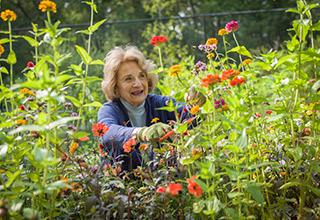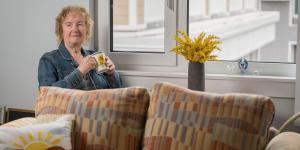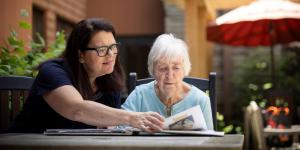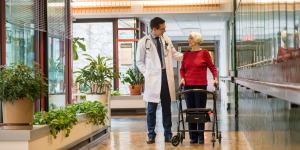7 Science-Backed Health Benefits of Friendship for Older Adults
Learn how friendship and social connection can lead to a healthier, happier, longer life.
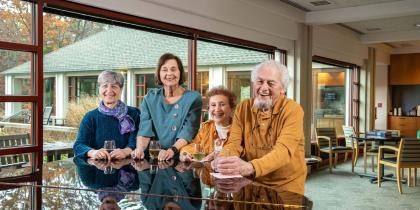
“We didn’t realize we were making memories. We just knew we were having fun.” – Winnie the Pooh.
Truer words about friendship were never spoken, even though they’re attributed to an imaginary bear. And thanks to a growing body of research, A.A. Milne’s lovable character may have also been unknowingly making significant health strides.
We’ve all encountered individuals throughout our lives who strike us as simpatico — people who share similar interests, laugh at the same things that make us laugh, and, well, are just fun to be around. Having even one good friend, along with feeling that we’re part of a greater community, can keep us socially engaged, foster a sense of purpose, and contribute to continued growth.
But did you know that there is now compelling scientific evidence that friendships are good for your physical as well as emotional health?
Health benefits of social connection for older adults
In 2023, the U.S. Surgeon General issued an advisory describing social isolation as an epidemic that threatens public health, especially among older adults. In the advisory, the U.S. Department of Health and Human Services shared research that shows maintaining a strong social network promotes healthy aging.
Existing research documents not only the psychological benefits of friendship, but also how it supports cognitive and physical functioning as we age. Good social connections can have many potential benefits, and may help you:
- Live longer: Living in isolation can actually affect your lifespan. One long-term study even found that people with meaningful social connections had a significantly lower risk of early mortality, demonstrating how powerful community is for our health.
- Improve your heart health: If you often feel lonely or isolated, you may be at greater risk of developing heart problems. The good news is that high-quality relationships can help you reduce your risk of heart disease!
- Avoid diabetes complications: Building a bigger circle of friends can actually help protect you from getting type 2 diabetes, heart attacks, and kidney disease.
- Protect your brain: For older adults, chronic loneliness and social isolation can increase the risk of developing dementia by about 50%. Regular contact with others can help keep your mind sharp as you age.
- Reduce stress: Having good friends around can help you manage stress more effectively. This means not only feeling better day-to-day but also possibly reducing the harmful health effects stress can cause in the long run.
- Avoid depression: Staying connected with people can help protect you from depression. Adults who report feeling lonely are more than twice as likely to develop depression as adults who report rarely or never feeling lonely.
- Stay healthier: Staying connected with others not only feels good but can also help you fight off illnesses and reduce your chances of getting seriously sick if you do catch a virus.
Older adults are more at risk of becoming socially isolated
As we grow older, we may need to be more intentional about making friends, maintaining social networks, and finding the activities that are right for us. Change is hard at any age, but for older adults, it may be harder to overcome decades of built-in habits or ways of approaching life.
A person who has recently lost a partner may have a particularly hard time making friends. Not only are they dealing with the sadness of losing a life partner, but they may not be accustomed to making social plans with others. Going from being part of a couple to being a single person can cause anxiety for some people.
Shy or introverted older adults may find making friends challenging. However, introverts have a better chance of sustaining friendships because they tend to have deeper relationships with fewer friends.
For all these reasons, life in a senior living community may be just the right antidote to social isolation, providing the healing effects of social interaction and community prescribed by the surgeon general. The key is finding the right community for you.
How senior living communities foster a sense of community for older residents
Hebrew SeniorLife’s Orchard Cove in Canton, MA, offers a strong model for how older adults can continue to make friends and form new community bonds even in the midst of change. Orchard Cove has a team in place that includes social workers, health care providers, wellness coaches, and residents who are dedicated to supporting wellness and independence for people who live there.
Everyone’s situation is different, so Orchard Cove staff take an individualized approach to welcoming new residents. Our staff respects the wishes of new residents who appreciate more alone time. But we also remain sensitive to ensuring no one becomes isolated — and so do our residents!
From the on-site medical team to those responsible for designing lifelong learning programs and cultural events, everyone plays a role in building a community that supports the well-being of all Orchard Cove residents.
As new residents become comfortable, they can also feel secure in knowing that they can remain within the Orchard Cove community should their support needs change. Along with apartments designed for independent living, Orchard Cove offers enhanced living and long-term care living options, all on the same campus.
Tips for building social connections
The ability and willingness to make new friends varies widely as we age. For some, it’s completely natural and easy to form new bonds. Others find it challenging. But when you consider the health benefits, connecting with others should be encouraged throughout life. If you live in a senior living community, there are many opportunities to find others who share your interests.
Here are some tips that can help you develop new friendships, no matter where you live:
- Be willing to step outside your comfort zone. Making new friends means being open to sharing information about yourself, including your life experiences. At the same time, be an active listener. Ask open-ended questions, follow up with them, and truly listen.
- Show up. The old notion that there are only six degrees of separation between all of us just may be true. Often, individuals move into a senior living community believing they don’t know anyone and find as they chat with community members that they have mutual acquaintances, lived on the same street, or attended the same church or synagogue.
- Join a club. Friendships often form with others who share common interests. Senior living communities and towns often offer a variety of programs and clubs that foster social interaction. If you don’t see one that interests you, such as a book club, try creating your own!
- Exercise. Not only is it good for you, but it also provides opportunities to meet others, whether at the gym or through groups that get together to walk, swim, or play sports. Even a garden club provides exercise that benefits older people.
- Be patient. Assume you won’t connect with everybody, and that is okay. You can’t expect to attend one coffee klatch or get-together to watch a movie and leave with a new circle of close friends. Building a relationship takes time. Studies actually show that repeated exposure to certain people increases attraction to them — familiarity breeds fondness. So keep at it. You may swing and miss, but at least you’re in the game and not watching from the sidelines.
Wonder if moving to a senior living community is right for you?
If you’re planning your next move and are interested in learning about our senior living options at Orchard Cove in Canton, MA, we are always happy to have a conversation. Contact us online or call 781-821-0820 to learn more.
Blog Topics
Learn More
A Community for Residents, By Residents
Orchard Cove, in Canton, MA, offers living options that span the full continuum of care, including independent living. The community is bustling with activities, from life-long learning to entertainment.
